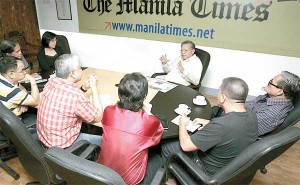FORMER Supreme Court chief justice Reynato Puno warned on Monday of chaos, including a possible military intervention, if the People’s Initiative (PI) to scrap the pork barrel, which he considers as the “last peaceful alternative” against government fund misuse, fails.
Sharing his thoughts at a roundtable discussion with the editors and reporters of The Manila Times, Puno said this alternative was incorporated in the 1987 Constitution as the people’s last nonviolent option to bring about changes that Congress cannot deliver.
“[It] is the last peaceful alternative for the people to take charge of their destiny . . . if it failed, we can expect the anger of the people to reach a higher temperature. There will be no other option left,” said Puno.
He said the People’s Initiative provision was created primarily to “take the people out of the streets.”
The 1935 and 1973 Constitutions did not have such a provision which, according to him, is “the reserve power given to the sovereign people in 1989 by Republic Act 6735.”
“When EDSA [People Power Revolution] 1 came to pass, they expanded the direct sovereignty of the people. Congress now shares the power to enact laws with the people,” Puno said.
He first made the call for a People’s Initiative against pork barrel at the height of the controversy stirred by the Priority Development Assistance Fund (PDAF) and the Disbursement Acceleration Program (DAP).
Since members of the Senate and the House of Representatives would not legislate measures that will run against their own interests, it was time for the people to enact a corrective law themselves through People’s Initiative.
The initiative, he added, should be used whenever Congress defaulted in enacting necessary laws or when legislators “betrayed public trust.”
Violence
Puno said he was merely reminding the public that they have a “lawmaking power that is not subject to presidential veto.”
But if the initiative fails either by the deliberate efforts of those who want to preserve the pork barrel or by sabotage, the specter of violence becomes a huge probability, he said.
“Kapag binara baka magkagulo [If this is stopped there may be chaos],” Puno said, hinting that there are certain sectors in the military that have become impatient and restive.
Asked if he thinks some people may be planning to take more drastic action when all else failed, he replied: “I would assume.”
The military is sworn by the Constitution to be “the protector of the people” and this responsibility may be invoked in case violence erupts, Puno said.
But how the military carries out its role as protector of the people “is not explicitly defined,” he said.
“There is a need for new leaders to come out . . . As we experienced in EDSA 1, madaling mag-alis ng gobyerno pero mahirap maglagay ng tamang tao [it’s easy to topple a government but it’s hard to put the right people in power],” Puno added.
Junta
In case violence flares, some sectors may work to form a junta, or the President himself might declare a state of emergency such as what the late strongman Ferdinand Marcos did.
It is also possible that drastic action may be spearheaded by the communist-leaning Left, the rightist elements in the military or even the central government, Puno said.
“What is important is the composition of the group that will hold the center. What is their advocacy? It can even be worse,” he said.
Puno is the chairman of the Puno Memorial United Methodist Church’s administrative council.
During a recent gathering at the Good Samaritan Church in Quezon City, he was quoted as saying that “the [PDAF] scam is the sad story repeated again and again in the history of governments. But the PDAF scam is more than the story of how our people’s money was pocketed by some lowlifes among our legislators.”
“The legislators have lost their moral authority to be the guardians of the people’s money,” Puno said in a separate interview.
In a statement, the Association of Generals and Flag Officers (AGFO), composed mainly of retired star-rank military officials, asked President Benigno Aquino 3rd to abolish the presidential pork.
Deputy Presidential Spokesman Abigail Valte said AGFO’s statement was meant to “galvanize efforts and support for people’s initiative against PDAF” espoused by Puno’s group.
“They are free to do that . . . that is part of our Constitution, they are perfectly free to pursue any means or measures that they feel would push their advocacies forward,” Valte said.
“We need not worry. We are not anxious about it because, again, if it is a citizen’s initiative, then that is within the bounds of law and they are free to pursue that as they wish,” she said.



